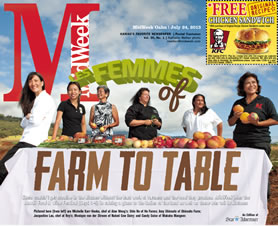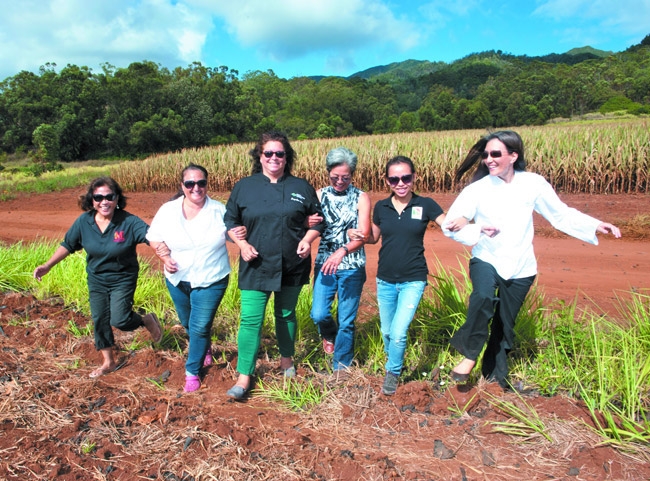Les Femmes Of Farm To Table
Chefs couldn’t get creative in the kitchen without the hard work of farmers and the food they produce. MidWeek joins the Hawaii Food & Wine Festival (Sept. 1-9) in raising a glass to the ladies of the land as well as those who toil in kitchens
A symphony conductor can be praised for her arrangement of a piece, yet never outshines the composer of the work.
Conversely, a chef spends a few minutes with a farmer’s lifetime of achievements and becomes one of the most recognizable names in the state, while the one whose sweat and toil brought it to life plods along in dusty obscurity.
mw-cover-072413-foodandwine-1
Hoping to shine a light on those who provide us with the most basic elements we need to thrive and survive is one of the beneficiaries of this chef-idol worship, a man whose name has become synonymous with food in Hawaii: Roy Yamaguchi.
“We all know that farming is hard work and has grueling hours, but they are the rock stars of our environment,” says Yamaguchi, who has been at the forefront of the farm-to-table movement in the Islands. “We can’t put good food on the table unless we have quality products from the fishermen and farmers. We need to know where our food comes from, and we need to teach our kids that, and it is important to see these farmers up close and personal.”
In order to draw attention to this underappreciated portion of our population, Yamaguchi and Oahu’s other super chef Alan Wong have included them in their ballyhooed Hawaii Food & Wine Festival, running Sept. 1-9.
This event is known for bringing in world-class chefs from across 14 time zones, as well as high-end winemakers. But the real stars of the show for Yamaguchi are the locally grown products and the people who produce them.
“We can do a lot of different things through this festival, promoting tourism while at the same time promoting our community,” says Yamaguchi, whose format for the festival has the chefs all incorporating locally sourced foods in their menus. “Using local products is the key element that sets our event apart from others across the country. Guests will get to ask the farmers questions, and the festival will bring the world closer to our community – and it is all through our food and culture, because without them, we are nothing.”
On the penultimate day of the festival, a brunch will showcase the only group that is less recognized than farmers: female farmers. Girls Got Game (+1), an event focused on 11 female chefs (and one dude) from around the globe and an all-female ensemble of farmers from the Islands, happens Sept. 8 at Hyatt Regency Waikiki Beach Resort restaurant SHOR. The lone dude is Sven Ulrich of the host hotel.
As the chefs soak up most of the attention, MidWeek decided to focus on the farmers, the women who literally bring home the bacon so that we can fry it up in a pan.
Shinsato Farms in Kahaluu has been raising pork for Hawaii eaters dating back to the 1940s, but in recent years it had begun to look as if there would be no way for the second generation of Shinsato farmers, Amy and Glenn, to keep the farm alive.
“But in the last two or three years, the marketing has changed for us,” says Amy, whose father chose pigs over cattle because of their quick turnaround time from piglet to pork chop. “It still is a struggle, but before this (the farm-to-table movement) I would have told you we would not continue. It is nice to see younger local chefs, like at Town, Salt and 12th Ave Grill, looking to us. If it hadn’t changed, we probably would be bums on the beach.”
They raise a couple hundred head on their nine-acre ranch at the base of the Koolaus. They keep them in pens rather than raise them free range because of the destructive nature of the beasts, and while they cannot compete with the cheap meat pushed out by factory farms, they can provide assurances that their Mainland competition cannot.
“The reason the locals look to us is that our food is safe – everything is done under very sanitary conditions. Factory farms don’t have that luxury,” says Amy, who has all her pigs butchered right there on her land, same as they have been for the past 70 years. “Locally, we take great pride in what we do, so we know that we will put out the best. If it does not look good, we are not selling it.”
In order to get some Shinsato Farms pork, people had to go to one of the high-end restaurants that feature her meat or visit Kokua Market on King Street, but now she is offering a family-sized portion of her pork in community supported agriculture (CSA) bags.
The bags feature 12 pounds of meat for $75 and consist of ground pork, chops, pork belly – and they throw in some soup bones and ribs as a bonus. And how does one get one of these bags? Just give her a call on her cell, as she puts it. She is willing to do anything to keep from living on the beach.
And as anyone who has tasted her pork will tell you, they will do almost anything to get their hands on one of her chops.
While Shinsato is the very definition of the classic farm, Makaha Mangoes shines as the example of what can be done in your own backyard.
Candy Suiso raises mangoes on the one-and-a-half-acre parcel of land her father, Reuben, bought on the Leeward side in 1955. He planted all variety of plants and trees on the land, discovering through the process that it was best suited for mangoes.
Unlike the Shinsatos, Suiso does not rely on her farm to keep her family living indoors. Her regular job is as executive director for Waianae High School’s Searider Productions, while husband Mark handles investments for First Hawaiian Bank.
But when the mangoes swell and begin to change color on the branch, the whole family pitches in to gather the crop from their 70 trees.
“There is nothing better than tree-ripened fruit. Fruit that is shipped to Hawaii is picked green and ripened in containers on the way here. We don’t pick anything until it is tree-ripened,” says Suiso, whose fruits are featured at Whole Foods and restaurants such as Roy’s and Alan Wong’s.







